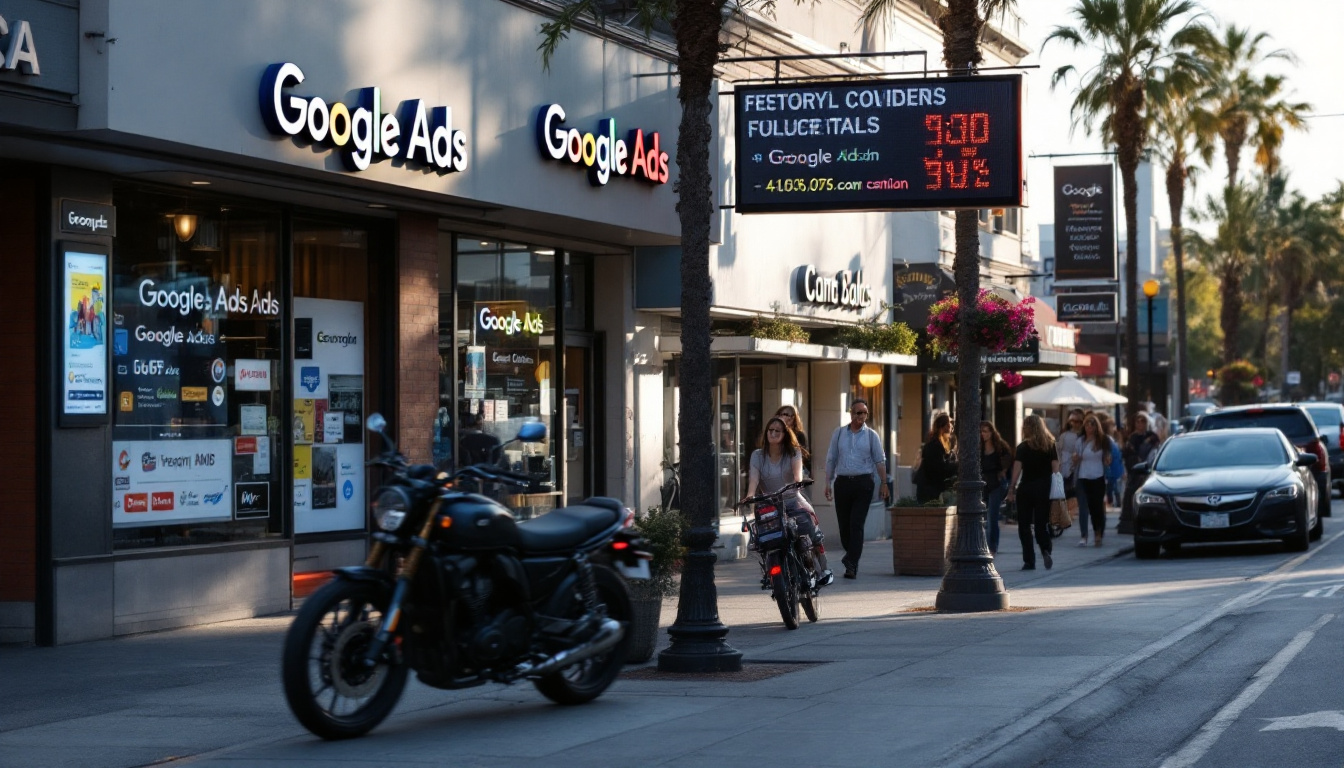What Fremont, CA Businesses Should Know About Google Ads Updates

Google Ads has become an essential tool for businesses looking to thrive in the fast-paced digital marketplace. In Fremont, CA, where competition is growing rapidly, understanding the updates and functionality of these advertising tools is crucial for maintaining an edge. This article will explore the latest updates to Google Ads, how they impact your PPC strategy, and how local businesses can adapt effectively.
Understanding the latest Google Ads updates
Google continuously evolves its advertising platform, making regular updates aimed at improving user experience and enhancing campaign performance. The latest wave of updates has introduced new features that can significantly impact how ads are created and managed. These changes often focus on automation, machine learning, and user personalization, which are designed to optimize ad delivery and engagement rates.

One of the most notable updates is the shift towards Performance Max campaigns, which enable advertisers to access all Google Ads inventory from a single campaign. This is a significant change from traditional campaign types, as it leverages machine learning to optimize ad performance in real-time across various platforms, including YouTube, Google Search, Display Network, and more. This holistic approach not only simplifies campaign management but also allows for a more integrated advertising strategy that can adapt to user behavior and preferences across different touchpoints.
Key features of the latest updates
The recent updates include several key features that Fremont businesses should be aware of:
- Performance Max campaigns: Combine multiple campaign types in one, allowing for improved reach and engagement.
- Optimization Score: A score that provides actionable insights on how to improve your campaigns.
- Enhanced audience targeting: The ability to refine targeting criteria with more detail and precision.
- Ad customizers: Dynamic ads that adjust content based on user behavior and preferences.
The importance of keeping up with changes
For businesses in Fremont, adapting to these updates is not just beneficial but essential. Keeping track of enhancements can lead to better campaign performance and, ultimately, higher ROI. Failure to adapt may result in wasted budgets, lower visibility, and missed opportunities for engagement. Moreover, as competitors also leverage these updates, staying informed can provide a crucial edge in a crowded marketplace. Understanding how to utilize these features effectively can transform a business's advertising strategy, allowing for more targeted outreach and improved customer connections.
In addition to the immediate benefits of these updates, they also reflect a broader trend in digital marketing towards automation and data-driven decision-making. As businesses increasingly rely on analytics to guide their advertising efforts, the integration of machine learning into Google Ads means that advertisers can now make more informed choices based on real-time data. This shift not only enhances the efficiency of ad spend but also fosters a more personalized experience for users, ultimately driving better engagement and conversion rates. As such, businesses should prioritize training and resources to fully harness the potential of these updates, ensuring they remain competitive in an ever-evolving digital landscape.
How updates impact your PPC strategy
When Google Ads rolls out new features and updates, it can have profound effects on the overall PPC strategy. For businesses operating in a competitive environment like Fremont, understanding these influences is vital for success.

With the introduction of automation and machine learning, advertisers must consider a more hands-off approach to campaign management. Automation tools help optimize bids and budgets, but they also require that businesses monitor and adjust their strategies based on performance data. This shift not only streamlines operations but also allows for a more data-driven approach, enabling advertisers to focus on strategic planning rather than day-to-day management.
Adapting to automation
As automation becomes increasingly prevalent in PPC, advertisers need to keep a close watch on how these changes affect performance. Here are steps to effectively adapt:
- Regularly review performance metrics: Examine which features are delivering the best results.
- Test different strategies: Use A/B testing to try out new features and automation options.
- Set clear goals: Understand what you want from your campaigns to leverage automation effectively.
Moreover, it is essential to stay informed about the latest trends and updates in the PPC landscape. Engaging in industry forums, attending webinars, and following thought leaders can provide valuable insights into how others are successfully navigating these changes. By sharing experiences and strategies, advertisers can foster a community of knowledge that helps everyone adapt more quickly and efficiently.
Additionally, as automation tools evolve, they often introduce new capabilities that can enhance targeting and personalization. For instance, features like responsive search ads allow advertisers to create multiple headlines and descriptions, which Google then tests to find the most effective combinations. This not only improves ad relevance but also enhances the user experience, driving higher engagement rates. Embracing these innovations can lead to a more robust PPC strategy that aligns with consumer behavior and preferences.
Adapting campaigns to new Google features
Adapting to new features is not just about implementing them; it's about strategically aligning them with your overall marketing goals. The evolving landscape of Google Ads requires businesses to be flexible and ready to pivot. Staying informed about the latest updates and trends can provide a competitive edge, allowing businesses to make informed decisions that resonate with their target audience.
For local businesses in Fremont, one effective approach is taking advantage of Performance Max campaigns. By setting clear goals for these campaigns, businesses can utilize the comprehensive data Google provides to determine the best course of action. This feature allows advertisers to access multiple Google channels, including YouTube, Display, Search, and Gmail, all under one campaign umbrella, thereby maximizing their reach and impact.
Strategies for successful adaptation
Here are a few strategies to consider when adapting campaigns:
- Utilize Smart Bidding: Take advantage of automated bidding strategies that leverage machine learning to improve performance. This can help businesses optimize their bids in real-time, ensuring that they are getting the best possible return on investment.
- Focus on creative assets: Update ad copy and visuals regularly to maintain engagement and relevance. Experimenting with different formats, such as video ads or interactive content, can also enhance user experience and drive higher engagement rates.
- Leverage customer insights: Use data to inform targeting and ad content, ensuring alignment with audience needs. Analyzing customer behavior and preferences can lead to more personalized marketing efforts, which are increasingly important in today’s competitive landscape.
Additionally, businesses should consider integrating seasonal trends and local events into their campaigns. For instance, promoting special offers during local festivals or holidays can create a sense of urgency and relevance. This not only helps in capturing the attention of potential customers but also fosters a connection with the community, enhancing brand loyalty. By continuously analyzing performance metrics and adjusting strategies accordingly, businesses can ensure they remain agile and responsive to the ever-changing digital marketing environment.
The role of automation in modern PPC campaigns
Automation is a central theme in the latest Google Ads updates, enabling businesses to streamline their PPC efforts. The integration of AI and machine learning is transforming how campaigns are managed, allowing for more efficient operations and improved performance.
These advancements reduce the manual effort required for campaign management. This can free up valuable time for businesses to focus on strategic planning, creative development, and other essential aspects of marketing. With automation handling routine tasks, marketers can delve deeper into analytics, uncovering insights that drive more informed decision-making and ultimately lead to better ROI.
Benefits of leveraging automation
Here are some benefits of utilizing automation in your PPC campaigns:
- Efficiency: Automation minimizes manual work, allowing you to spend more time on strategy.
- Improved accuracy: Automated systems can optimize ads based on data in ways that manual efforts cannot.
- Real-time adjustments: Machine learning algorithms can make adjustments to campaigns almost instantaneously, improving performance.
Additionally, automation can enhance targeting capabilities. By analyzing user behavior and preferences, automated tools can identify and reach the most relevant audiences, ensuring that ads are shown to those who are most likely to convert. This level of precision not only boosts engagement rates but also optimizes ad spend, as businesses can allocate their budgets more effectively.
Moreover, automation facilitates A/B testing at a scale that would be challenging to achieve manually. Marketers can set up multiple variations of ads, landing pages, or keywords and let the automated systems determine which versions perform best. This data-driven approach ensures that campaigns are continuously refined and optimized, leading to sustained improvements in performance over time.
Key takeaways from recent Google Ads changes
The recent changes to Google Ads are poised to reshape the advertising landscape significantly. For Fremont, CA businesses, staying informed and adapting to these changes is critical for achieving success in PPC campaigns.
Key takeaways from the latest Google Ads updates include:
- Embrace automation: Businesses should not fear automation but rather view it as an enhancement to their existing processes.
- Continuous learning: Keeping up with updates and best practices is necessary to optimize ad performance.
- Focus on data: Leverage analytics and insights to drive decision-making in your PPC campaigns.
By integrating these takeaways into your marketing strategy, you can ensure your campaign remains competitive and effective in an ever-changing landscape. Understanding the latest Google Ads updates and adapting accordingly will provide Fremont businesses with the tools necessary to maximize their advertising efforts.

As a Google Ads expert, I bring proven expertise in optimizing advertising campaigns to maximize ROI.
I specialize in sharing advanced strategies and targeted tips to refine Google Ads campaign management.
Committed to staying ahead of the latest trends and algorithms, I ensure that my clients receive cutting-edge solutions.
My passion for digital marketing and my ability to interpret data for strategic insights enable me to offer high-level consulting that aims to exceed expectations.